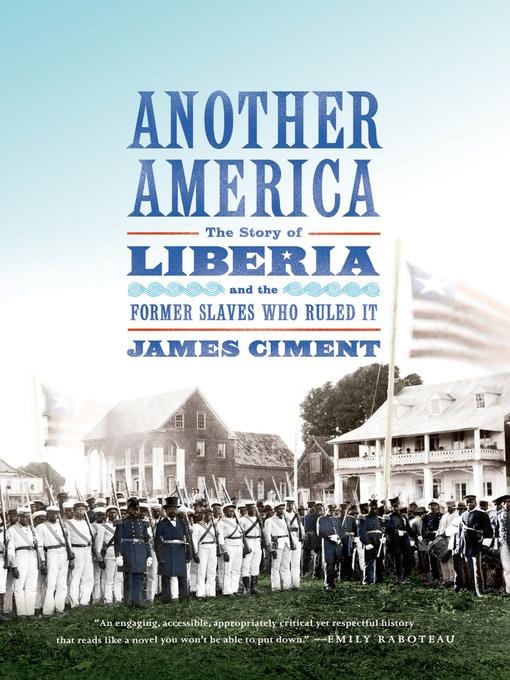
Another America
The Story of Liberia and the Former Slaves Who Ruled It
- اطلاعات
- نقد و بررسی
- دیدگاه کاربران
نقد و بررسی

May 13, 2013
Few in the U.S. could identify Liberia on a map, but the two nations’ histories are inextricably intertwined. Founded in 1822 as a colony for African-Americans returning to Africa, Liberia was created in the image of the U.S., and the former slaves and free blacks who moved there, driven by idealism or by poverty, “endeavored to recreate the only social and political order they knew, that of the antebellum South—with themselves as the master class.” Ciment (Atlas of African-American History) paints a vivid picture of the challenges faced by the settlers: although supported by the U.S., formal recognition of their independence was delayed by nearly two decades due to American diplomatic society’s refusal to host a black ambassador. Riven by troubled relations with the native population and familiar racial baggage—natives railed against “a small, light-skinned elite work against the will of the black masses”—the settlers nevertheless resisted foreign invasion and maintained control of the country for over 130 years, before a bloody coup ushered in decades of violence. Enlivened by profiles of some of the early settlers, this is an engaging and accessible account whose only shortcoming is its failure to discuss the implications of Nobel Peace Prize–winner Ellen Johnson Sirleaf’s election to the presidency in 2011.

June 1, 2013
The 19th-century story of the pursuit by free African-Americans to found and govern the Republic of Liberia. Independent scholar Ciment (Atlas of African-American History, 2007, etc.) recounts the rarely told tale of Liberia's formation. Reminiscent of the Mayflower journey 200 years before, in January 1820, a small contingency of free African-Americans set sail aboard the Elizabeth in an effort to form a new nation in Africa. At the encouragement of the American Colonization Society--a group fearful of the effects of free blacks on the established order--90 or so willing participants left their old world behind to try their luck overseas. Motivated by evangelism, economics and the chance to escape the "indignities, inequities, and outright dangers free black men and women faced in a white man's country," the pioneers were soon disheartened to learn that luck was not with them. Faced with disease and poverty, several years passed before they found their footing. Yet even upon ratifying Liberia's "Declaration of Rights" in 1847, it was soon apparent that the new country maintained the same shortcomings as the one they'd left behind. "In combining higher ideals with self-interest," Ciment writes, "Liberia's founders were not so different from the framers of the American Constitution." Self-interest became a scourge for the fledgling nation, proving that greed, ambition, corruption, bribery and extravagance transcend oceans and color barriers. By the 20th century, Liberia further deteriorated due to its growing dependence on foreign loans, allowing for European encroachment on the once-sovereign land. In 1980, a violent coup destabilized the country further, prompting Ciment to deem Liberia "a noble experiment that had ended awfully"--and that got even worse with the terrifying reign of Charles Taylor. A scholarly yet accessible examination of Liberia's tumultuous history that gleans new insight into America's own struggles with democracy.
COPYRIGHT(2013) Kirkus Reviews, ALL RIGHTS RESERVED.

September 15, 2013
The West African nation of Liberia was founded in 1822 by about 80 former American slaves. These men and women emigrated under the notion that the United States was not a place where blacks could reach their full potential; their decision was also largely influenced by former slave owners and the American Colonization Society, both intent on seeing America become a white man's country. Ciment (American Immigration: An Encyclopedia of Political, Social, and Cultural Change) shows how, with little actual help from their former masters, the willing immigrants endured harsh conditions in their new home. Ironically, as the colonists were versed in the ways of the antebellum South, the Liberian social order relied heavily on skin color, segregating the light-skinned mulattos, deemed untrustworthy, from the affluent, dark-skinned gentry. Operating as a paternalistic government, Liberia only slowly progressed to a poorly managed nation complicated by bad politics and greed. VERDICT Ciment does a wonderful job telling the story of Liberia, demonstrating thorough research and clear storytelling. Although some general readers may find the density of information a bit daunting, most will deem this a thought-provoking and informative read, expanding our understanding of Liberia's place in our own history.--Cicely Douglas, Palm Beach Cty. Lib. Syst., FL
Copyright 2013 Library Journal, LLC Used with permission.

July 1, 2013
From a distance, the decades of turmoil in Liberia, including an exceptionally barbaric civil war, may seem indistinguishable from the instability and violence wracking so much of postcolonial Africa. But Liberia has been, theoretically, an independent nation since 1847, and its history has been strongly linked to the U.S. rather than European colonial powers. Ciment, an independent scholar specializing in African American history, has provided an interesting perspective on Liberia's history. In the 1820s, emancipated American slaves settled there under the sponsorship of antislavery activists. The rhetoric of these founders is filled with idealistic hope eerily reminiscent of the city upon a hill sentiments expressed by the Pilgrim and Puritan arrivals in New England. But New England was not empty and neither was this equatorial region of West Africa. As Ciment illustrates, it was that fact that was a driver of much of Liberian history. The so-called Americo-Liberians quickly established themselves as a governing class, ruling over the vast majority of indigenous ethnic groups and causing the predictable social and economic resentments. This is an informative account of a nation that has been strongly influenced by our own.(Reprinted with permission of Booklist, copyright 2013, American Library Association.)




دیدگاه کاربران